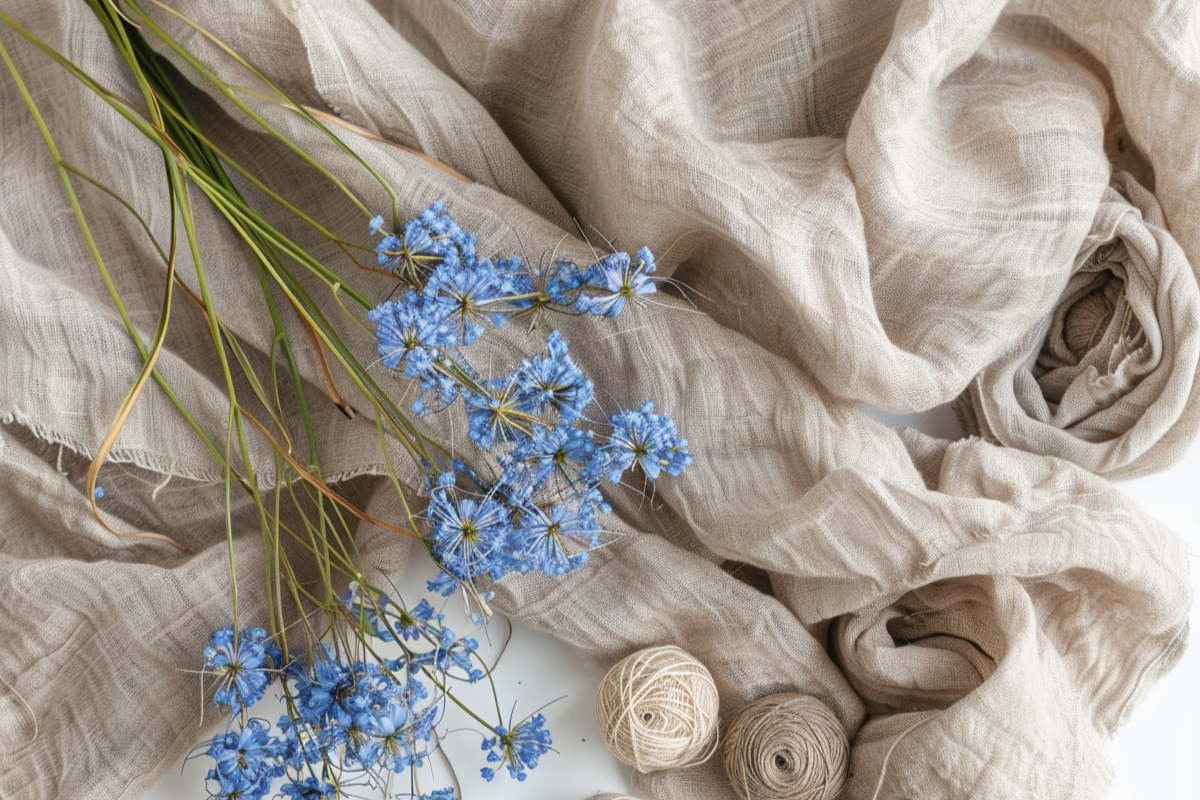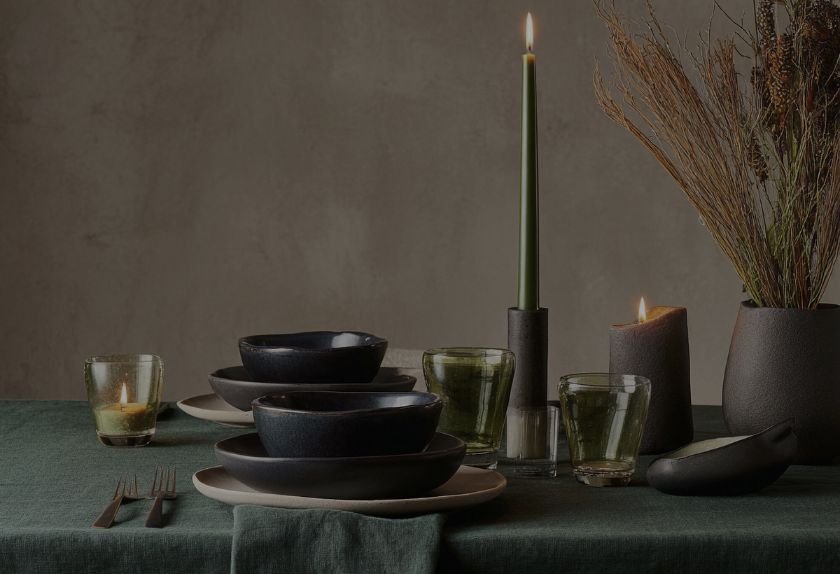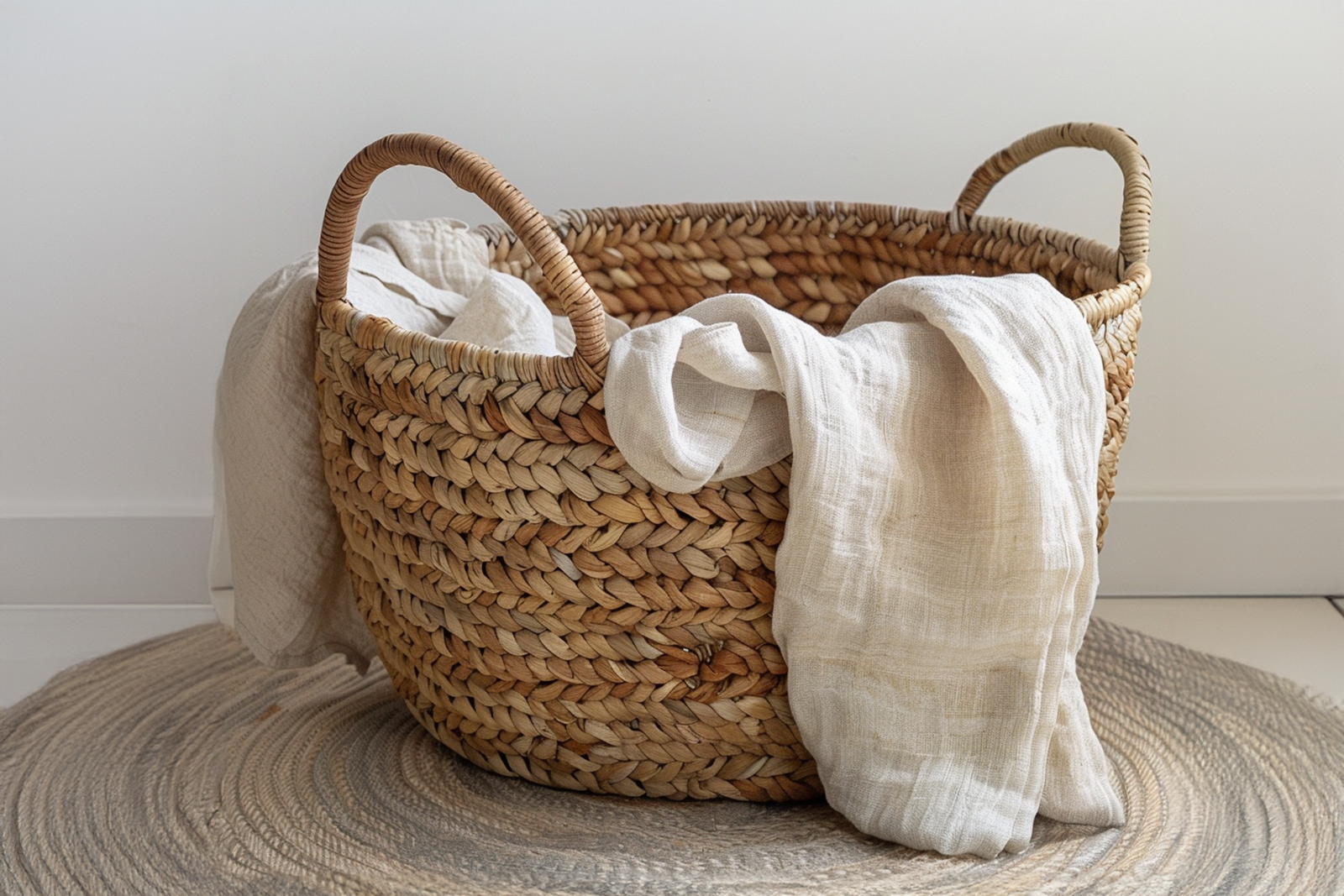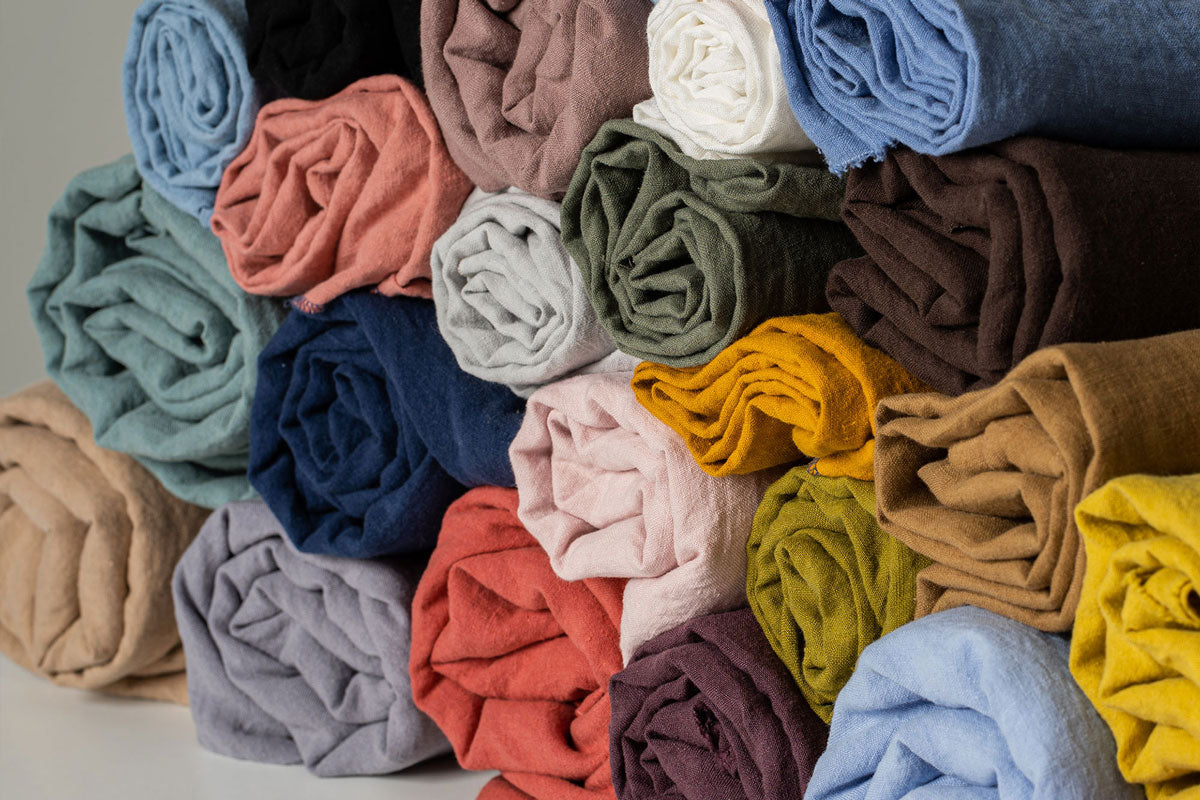men
Home
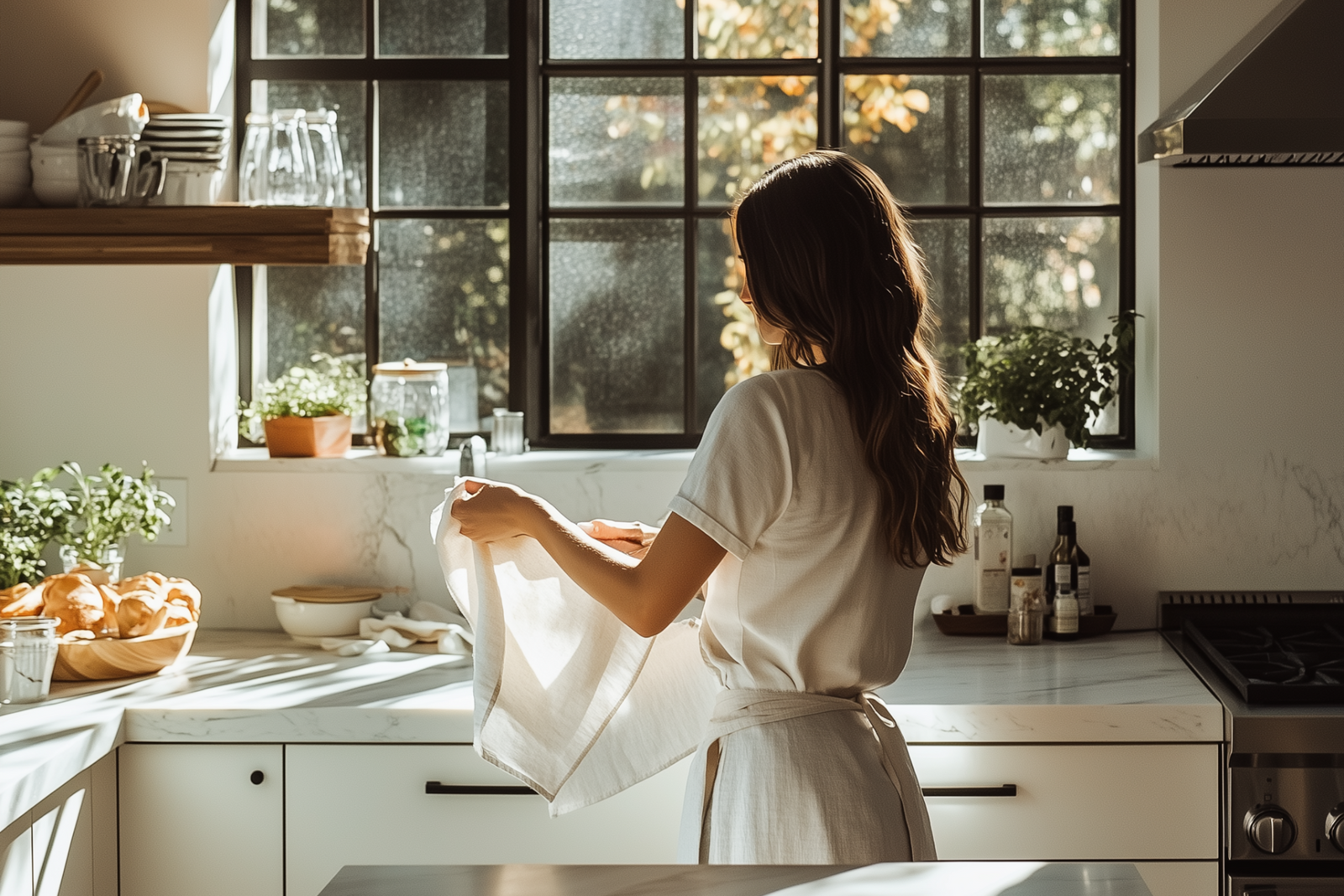
Eco-Friendly Kitchen: 3 Ways to Use Natural Textiles
February 01, 2025 6 min read
Sustainability is a hot topic in various spheres of our lives, garnering attention in sectors such as energy, transportation, and agriculture. As a brand, we primarily focus on sustainability in fashion, but it's crucial to recognize its importance in other aspects of our daily routines, including our homes. One area where sustainability can make a significant impact is in the kitchen, where mindful practices can lead to a healthier planet and a more eco-friendly lifestyle.

Today, we will show you how to make your kitchen more environmentally friendly by making conscious decisions about home textiles. By choosing sustainable materials, you can significantly reduce your kitchen's environmental impact. These simple yet effective changes will help you create a kitchen that is both practical and aligned with your commitment to sustainability.
Simple home textile swaps for a more sustainable kitchen
In many kitchens today, single-use plastics dominate food storage, while knocking over and spilling some liquid on the kitchen counter makes you subconsciously use excessive amounts of disposable products. This pattern reflects a broader trend of convenience over sustainability, where inefficient practices create unnecessary waste. Not a pretty picture, if you are seeking a sustainable home, right?
However, there are options that provide both convenience and sustainability. So, in order to address these issues and foster a more eco-conscious approach to everyday kitchen activities, these options could help:
1. Ditch plastic for reusable storage solutions
Did you know that according to the WWF (World Wide Fund for Nature), more than 430 million tonnes of virgin plastic are produced each year, a significant portion of this is used for packaging food and other everyday items? This staggering amount of plastic not only contributes to environmental degradation but also exposes us to harmful chemicals.
Making the switch to reusable storage solutions is a small change that can have a big impact. Linen storage bags, for example, are a fantastic alternative to plastic. They are not only free from the harmful chemicals found in plastics but also highly versatile. The great thing about them? They can be used anywhere - from storing clothing in you travel baggage to organizing small kitchen tools.
Here’s why linen storage bags are a great choice:
✔️Chemical-Free: Unlike plastic, linen is free from harmful chemicals, ensuring safer food storage.
✔️Breathable and Hygienic: The breathable fabric helps keep food fresh for longer by preventing the build-up of moisture and mold.
✔️Multi-Purpose: Whether you’re organizing your pantry, packing for a trip, or decluttering your home, linen bags are incredibly versatile.

⭐HOME TEXTILE FAVORITES
LINEN STORAGE BAG
✔️Home textile bestseller
✔️Well-ventilated items
✔️Suitable for food storage
✔️Perfect for travel

⭐HOME TEXTILE FAVORITES
REUSABLE LINEN BREAD BAG
✔️Home textile bestseller
✔️Wide color range
✔️Suitable for food storage
✔️Various sizes
2. Go green with reusable towels
Paper towels are not an eco-friendly option, and a very pricey habit, that can become pretty heavy on the pocket.On average, a household using paper towels might spend over $500 a year, while reusable options like kitchen towels, dish towels, and tea towels offer a one-time investment that reduces ongoing expenses. By opting for reusable towels, you can significantly lower your costs and minimize waste.
Linen towels, in particular, are a great choice for kitchen use. For example, they are easily applicable in kitchen scenarios. Linen dries quickly, so you won’t have to wait a long while to reuse it and the need for disposable cloths will be eliminated. Also, linen is made organic, without use of harsh chemicals, that are emitted into the environment during the production of paper towels. With various fabrics and blends available, you can select the one that best fits your needs and preferences.
Here’s why opting for linen towel is a smart decision:
✔️Cost-Effective: Reduces waste and saves money over time.
✔️Quick Drying: Enables immediate reuse and minimizes the need for disposables.
✔️Chemical-Free: Fewer chemicals than paper towels, better for health and the environment.
3. Choose sustainable table textile
And if you want to dive in deep into the sustainable journey, there’s a great variety of choices for kitchen decor - throwing in a bit of table linen, such as linen napkins, can adorn your kitchen setting, in keeping with a minimalist theme. For example, linen table runners are a universal choice. Whether it is a wedding reception, Thanksgiving or Christmas dinner, or just a regular family meal, table runners can feel both practical and luxurious.
If the dining table gets messy, there's no need to worry because linen kitchen textiles are low-maintenance. You can quickly address spills and stains, keeping your dining area looking pristine. This makes them an excellent choice for dinner settings with kids, as they can handle the inevitable messes with ease.
In general, linen table decor is a fine choice if you have limited storage and a set budget. Because of it’s durability, linen will surely last a longer time than synthetic fiber fabrics and won’t start to disintegrate or tear after a few uses. And if you look after it, linen will outlive any polyester table cloth and eliminate the need to repurchase paper napkins.
Linen napkins and table textiles are an excellent choice for several reasons:
✔️Timeless Style: Adds a classic and elegant touch to a dining setting, enhancing your decor.
✔️Durable Fabric: Linen is known for its strength, ensuring that your table textiles will last for years.
✔️Low-Maintenance: Linen textiles are easy to care for, making them ideal for everyday use.

These might not seem like a lot, but over an extended period you will feel the difference yourself. These choices toward building an eco-friendly kitchen will not only make you feel good for contributing, but also will ensure an increase of comfort in your daily kitchen endeavors.
Choosing the right fabrics: What choices are there?
Considering kitchen textile there are so many choices, that it is easy to get lost and have no clue about your textile needs. In case you are in a bind, we have broken down sustainable fabric options into main categories and compared them with each other:
| Property | Linen | Cotton | Bamboo |
| Sustainability | Highly sustainable (low water and pesticide use) | Sustainable when organic (high water and pesticide use when conventional) | Sustainable (grows quickly and requires minimal pesticides) |
| Durability | Very durable, becomes softer with use | Durable, but may wear out faster than linen | Durable, retains softness over time |
| Hygiene | Naturally, antimicrobial, resists mildew | May retain odors and mildew if not dried properly | Naturally antimicrobial, resists odors and mildew |
| Shrinkage | Minimal shrinkage | Moderate shrinkage | May shrink faster duo to high water-holding capacity |
| Moisture-Wicking | Excellent moisture-wicking properties | Moderate moisture-wicking properties | Excellent moisture-wicking properties |
Given these factors, one can choose their preferred option. Our recommendation would be to look into cotton and linen options, due to their hygiene, practicality, sustainability and durability features. Especially since finding linen products is quite easy nowadays - there is a wide variety to choose from.
Top tested fabric recommendations
If you successfully familiarized yourself with the common types of kitchen textile materials, we can dive into choosing the right blend. Depending on your kitchen duties, you can choose between pure linen or 100% cotton. Or maybe a bit of both? There are many variations, when considering a blend of a few materials, because each of them have their pros and cons. Let’s take a look at a few suggestions:
100% Linen
First of all, 100% linen cloth. This option is perfectly suitable for drying dishes, polishing glassware or lining bread baskets and other decorative aesthetics. The certified pure linen option is great if you want a long-lasting, durable and sturdy kitchen textile item. We've tested the fabric's durability to ensure these options are both reliable and resilient.

⭐HOME TEXTILE FAVORITES
LINEN DISH TOWEL
✔️Home textile bestseller
✔️Perfect for polishing and drying
✔️4 sizes
✔️Wide color range
100% Cotton
On the other hand, 100% cotton is a fine choice, if you adore baking and are always trying something new - cotton dish towels are great for handling hot pots and pans, covering food or general after-cooking clean up tasks.
Linen and cotton blend
Why sacrifice one perfectly practical feature for the other? There are plenty of linen and cotton blend choices. For example, let’s take a look at 55% cotton and 45% linen blend waffle fabric. It combines the best qualities of both cotton, and linen. It dries fast, helping prevent microorganisms on the cloth, yet it is absorbent and can be suitable for most kitchen needs. After extensive testing and experimentation, we suggest a guaranteed option for durability and absorbency:

WAFFLE KITCHEN TOWEL
✔️Home textile bestseller
✔️Perfect for wiping and hot cookware
✔️55% cotton, 45% linen
✔️Natural colors
Small swaps, big impact
While you should consider various fabric options for your kitchen, incorporating eco-friendly choices like linen or cotton can significantly enhance sustainability. Good practices with these materials will ensure they stay durable and effective. By thoughtfully selecting and using these textiles, you can reduce waste and boost your kitchen’s functionality. Each mindful decision contributes to a greener future, making every kitchen upgrade count.






